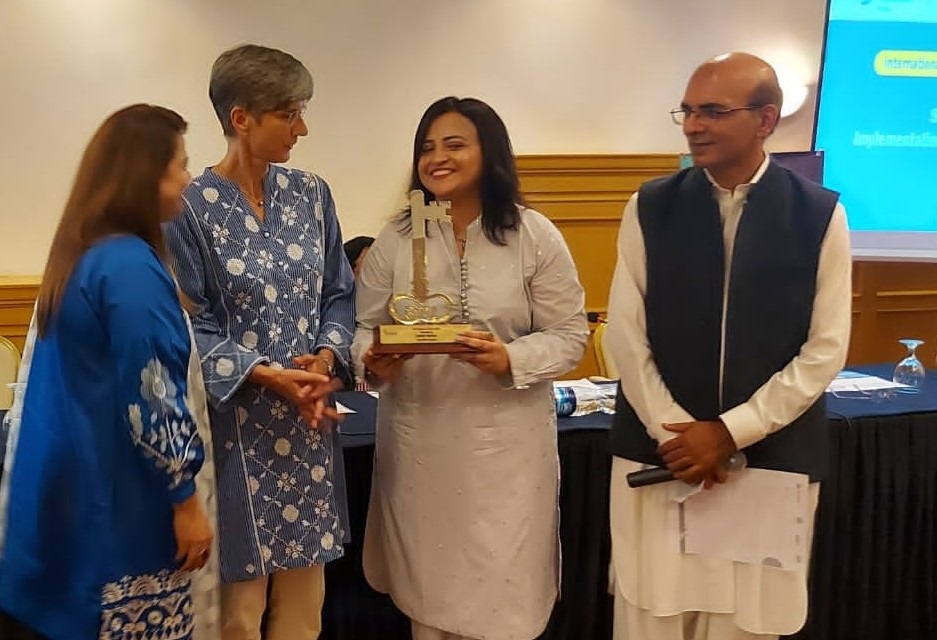RTI is important tool for aspiring female investigative journalists, Saddia Mazhar
Access to information laws enables journalists to obtain official information, RTI award-winning female journalist told in an exclusive interview

As the Covid-19 pandemic badly affected lives and businesses across the world. The pandemic has accelerated the process of digital adaptation. The pandemic forced people around the world to shift their focus toward digital technology for availing services and employment opportunities. Digital technologies have revolutionized the media landscape. Like the rest of the world, Asian countries, especially Bangladesh, India, and Pakistan, started relying on digital news websites to get authentic information.
With the increase in the use of social networking websites (social media), complaints of unauthentic news and information are also common in society, and alarmingly these complaints are increasing with time. In these circumstances, investigative journalism, authentic documents, and the quest for access to authentic information have gained more importance. Article 19A of the Constitution of Pakistan gives every citizen the right of access to information from government institutions. However, due to the lack of effective implementation of these laws, journalists and ordinary citizens alike are facing difficulties in accessing official information.
Saddia Mazhar, a female journalist from Sahiwal, Punjab, has consistently and effectively used RTI laws for her investigative journalism. She has proved that authentic information from government institutions can be obtained through the effective, consistent use of these laws. She proved that access to official information and documents is not something like impossible.
The prudent female journalist Saddia Mazhar was honored with the “RTI Champion” award in the field of journalism for effectively employing access to information laws for investigative journalism. She was honored with the award by Coalition on Right to Information on the occasion of World Access to Information Day.
 While talking with “The Reporters”, Saddia Mazhar said every training workshop related to investigative journalism stresses the importance of access to information laws for investigative journalism. However, the inclination of journalists in Pakistan to use these laws is shallow due to various reasons. About 18 months ago, I decided to regularly use the Access to Information Act to obtain official information from government institutions.
While talking with “The Reporters”, Saddia Mazhar said every training workshop related to investigative journalism stresses the importance of access to information laws for investigative journalism. However, the inclination of journalists in Pakistan to use these laws is shallow due to various reasons. About 18 months ago, I decided to regularly use the Access to Information Act to obtain official information from government institutions.
In the beginning, it wasn’t easy to get information through RTI laws. However, after regularly using these laws, the situation has changed, and some information or documents are coming to our office every other day. Now, we have to choose which documents to be reported first.
Saddia further said that the beauty of these laws is that I can get information and documents from any government department in the country, while sitting at my home in Sahiwal. These laws enabled me to get official information from the Prime Minister House, President House, and Chief Minister Secretariat in Peshawar. Initially, I thought these all were stories, but after employing these laws, I realized that these laws give journalists access to information from the power corridors.
Information Commissions are faced with a lack of human and financial resources, the RTI Champion female journalist noted.
In response to a question regarding the long wait for obtaining information, Saddia Mazhar said that it is true that obtaining information under these laws takes time, and sometimes it takes several months. Since the inception of electronic media, journalists have been habitual to getting immediate information to give breaking news, she argued. Therefore, they are reluctant to practice these laws; however, she noted this is the difference between investigative journalism and regular reporting.
Saddia was of the opinion that these laws could be more beneficial for female journalists because, under these laws, you do not need to visit anywhere. Under these laws, government departments are obliged to send you all the requested information and documents at your given address. Therefore, female journalists can use these laws from anywhere to ask questions from any government department of the country.
She further says that the law of access to information in Pakistan is like a key, through the proper use of which information is in the hand of the journalist. However, there is a need to further simplify the process of using this law. Journalists worldwide are also given trainings in data journalism and investigative journalism. However, unfortunately, journalists in Pakistan are always in the race for breaking news and remain unaware of many such fellowships.
In response to a question about the performance of Information Commissions, Saddia Mazhar said that it is true that complaints in Information Commissions have been pending for several months for various reasons. One reason is that Information Commissions are subordinate to the government, and in case they take strict action against other government bodies, when matters about these Commission go to them, they will also respond in the same manner to equal the score. Another primary reason is that Information Commissions lack resources; almost all the Information Commissions face challenges in terms of human and financial resources. Despite limited resources, these Commissions are trying to ensure the provision of information to the citizens.






